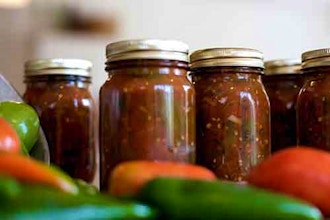Discover the Best Pickling Classes Online
Pickling is a technique for preserving food using acids that dates back as early as 2400 BC in ancient Mesopotamia. While the term “pickle” probably brings to mind pickled cucumbers, and many of the most commonly-pickled foods are vegetables, virtually any ingredient can be preserved with an acidic pickling. Other “uncommon” foods particularly suited to this briny method of preservation include pork and herring, which respectively form staples of Cajun and Nordic cuisines.
Pickling can be performed through one of two primary methods. The simpler version is through a vinegar immersion, simply covering the ingredients in a solution of vinegar and water. The more involved method involves anaerobic fermentation in brine, whereby lactic acid bacteria produce the necessary acidity to preserve the food.
Regardless of the method, pickling relies on the presence of acid. The acidity of the pickling liquid serves to inhibit the growth of harmful bacteria, most commonly clostridium botulinum, known as the cause of botulism. At the same time, the acid promotes the growth of beneficial bacteria like lactobacillus, which produces the distinctive tart flavor associated with pickles and may even have positive health benefits.
Why You Should Learn Pickling Online
Minimize waste and maximize taste with the versatile art of pickling. Whether you are simply looking to extend the shelf life of your ingredients or are seeking creative ways to spice up your culinary greetings, pickling is an invaluable addition to any cooking skill set.
If you find yourself with an abundance of fresh produce or meats, and know that you won’t be able to enjoy everything fresh, consider pickling before turning to the trash can, the compost heap, or the freezer. Unlike other techniques for minimizing waste, pickling has a distinct impact on flavor that goes above and beyond the mere preservation of food. Whereas other methods like freezing can even have a detrimental impact on the flavor and textures of foods, pickling can preserve a food while imparting a distinctive flavor and, in many cases, crispness to food. The unique tang of a pickle simply cannot be reproduced through other conventional methods of food preservation.
Virtual Pickling Classes
While many towns and cities have thriving communities of pickle makers willing to offer classes, others may struggle to provide compelling options for aspiring picklers. Fortunately, access to quality instruction doesn’t have to be limited by the options in your local community. Regardless of whatever local listings are currently available, an online class can be a great way to access quality instruction from anywhere in the world. To help you find the perfect class, CourseHorse compiles listings of quality online pickling classes.
The increased accessibility of an online class does, however, come with a few minor drawbacks. Most notably, online classes lack the dedicated workspace and pre-provided ingredients offered by in-person classes. An online class will, of course, provide a list of necessary ingredients and materials, but it is the responsibility of each participant to obtain them. Moreover, each participant will need to set up an appropriate workspace at their own location, establishing a space for both performing the pickling techniques and participating in a video call. Essentially, an online class demands a greater degree of preparation prior to class time, a relatively low barrier to accessing quality instruction.
For virtual classes that prioritize hands-on experience, join Chicago’s premier recreational cooking school, The Chopping Block, for classes on pickling techniques. Their classes prioritize practical performance of technique rather than simply following a recipe, which means you’ll have plenty of opportunities to refine the prerequisite pickling skills.
As the summer peach season begins, The Chopping Block prepares to get the most out of the juicy fruit in Sweet and Savory Peach, a class that teaches multiple methods for incorporating peaches into culinary creations. A quick pickle can provide a tangy twist to the sweet summer fruit, making a great centerpiece for a savory salad of arugula and basil. Because The Chopping Block’s approach emphasizes building technical proficiency in cooking techniques, pickling techniques feature as a core component of what is covered in this cooking class.
If it's pickles more so than peaches that pique your interest, be sure to keep up to date with the course offerings of The Chopping Block. In the past, they have conducted virtual cook-alongs like Refrigerator Jams, Jellies & Pickles, which focus more specifically on techniques for preserving foods. Pickling techniques featured in this class through a quick pickled dilly bean, a tasty way to prepare and preserve summer green beans. Water bath canning, a slightly more time-intensive way of pickling, was not actively conducted during this class, but instructions for the process were provided in a recipe packet to help facilitate this method of pickling at home.
If a comprehensive approach to sustainable cooking techniques sounds appealing, keep an eye on the course offerings from Teaching Table. Teaching Table operates on a fourfold strategy to shop less, cook more, and waste nothing. Teaching Table believes in sustaining the environment and local communities by sourcing ingredients from local vendors. Teaching Table has, in the past, offered online classes like Cook with What You Have designed to help make the best use of the ingredients in your pantry. If your interest in pickling is driven by a sustainable mindset and an unwillingness to let food go to waste, keep an eye on Teaching Table’s rotating selection of classes.
Private Online Group Pickling Classes
Food forms the core of many of the most common social events. From a humble family dinner to a swanky wine and cheese tasting, the preparation and consumption of food as an intimate group is a great way to both show appreciation and form strong social bonds. Among its many cooking and tasting classes designed to help groups bond over food, CourseHorse offers pickling classes for private groups.
Learn techniques to craft your own pickles and then showcase them in an exquisite presentation through CourseHorse’s Virtual Charcuterie Board Party. In this class, you’ll delve into the world of charcuterie boards, where assembling a stunning display goes beyond simply slapping meats, cheeses, and pickles onto a cutting board. Learn how to create your own pickles, craft a flavorful mostarda, and even fashion a salami rose as part of a spectacular spread. The course provides a comprehensive recipe list encompassing the necessary ingredients for pickling, such as the all-important vinegar and spices like black peppercorns and bay leaves. Do note, however, that this course does not provide and ship these materials as part of the cost; participants are encouraged to use the provided ingredient list to gather the necessary materials beforehand.
CourseHorse can also provide personalized classes that are customized to your particular pickling interests. If the available group classes don’t quite align with your needs, you can contact CourseHorse to explore further possibilities for pickling classes.
Booking an online group course with CourseHorse is a straightforward process. Simply follow their user-friendly checkout procedure, and you’ll receive a confirmation of your booking within 24 hours. The event provider will also reach out to you with a personal introduction, sharing additional information about the course. Should you need to make changes to your booking, modifying your group size is easy. Once you’ve booked, CourseHorse will hold your date, but allow you to add or subtract from your group size after making the reservation, and will only finalize payment once you’ve finalized your headcount.
Online vs. In-Person Pickling Classes
The fastest, most efficient way to learn how to pickle is to enroll in a formal class, which can be conducted in one of two distinct modes, either as an in-person class or as an online class. Regardless of the modality of the course, a formal class offers access to an expert instructor who can provide feedback in real time, answer specific questions, and help to troubleshoot particular difficulties that arise throughout the process.
In-person classes typically have an advantage when it comes to the classroom environment. The face-to-face nature of an in-person class can make the experience feel more intimate, as you are actually sharing the physical space with the instructor and with fellow classmates. Moreover, the environment is set up specifically for the pickling process, providing a suitable workspace and all of the necessary ingredients and tools.
Online classes have a distinct advantage when it comes to flexibility, particularly flexibility in geographic location and in scheduling. Whereas access to in-person offerings can be limited by geographic location or by a busy work-life schedule, online classes provide quality experiences independent of such limitations. These classes reproduce much of the experience of an in-person classroom, especially the ability to interact with an expert instructor in real time, but also offer the added flexibility of being able to participate from anywhere instead of needing to commute.
Can I Learn Pickling for Free Online?
It is incredibly easy to jump into pickling with minimal investment. Unlike many other cooking or baking techniques that require a set of prerequisite skills, it is easy for even a novice chef to try her hand at pickling; an initial foray into pickling can be as simple as following along with free video tutorials or blog post instructions. However, don’t be discouraged if that first batch isn’t quite as crisp or delicious as your favorite store-bought pickle. While it is easy and cheap to get started, it requires a bit of practice and trial-and-error to get the proper flavors and textures in the final product. The fastest, most effective way of fast-tracking through this experimental stage is to get a helping hand from an expert.










